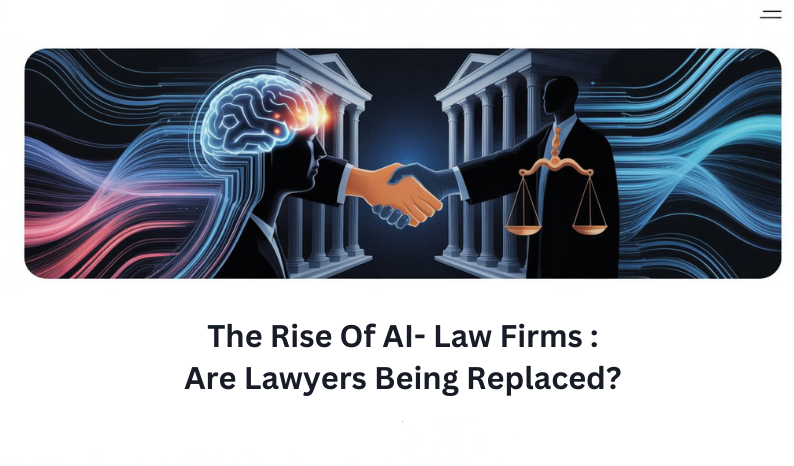The Future of AI in Law: From Courtrooms to Classrooms
Artificial Intelligence (AI) is no longer just a buzzword—it is becoming a disruptive force across industries, and the legal sector is no exception. The future of AI in law is being shaped not only in courtrooms where justice is delivered but also in classrooms where the next generation of legal professionals is being trained. From predictive legal analytics and AI judges to AI-driven legal education, this transformation is redefining how lawyers, judges, and students interact with technology.
This blog explores how AI is influencing both judicial processes and legal education, the benefits and risks, and what the legal profession can expect in the coming decades.
One of the most ground breaking applications of AI in law is in the courtroom. AI technologies are being developed to support judges, lawyers, and litigants by:
- Case Prediction: Machine learning models can analyze thousands of past rulings to predict outcomes, offering valuable insights to attorneys.
- Legal Research Automation: AI tools like Casetext and LexisNexis streamline research, saving hours of manual effort.
- Sentencing Assistance: Some jurisdictions are experimenting with AI systems that recommend sentences based on prior cases and crime data.
- Courtroom Transcriptions: Natural Language Processing (NLP) tools automatically transcribe hearings, improving record accuracy.While the idea of AI judges may sound futuristic, experiments are already underway. For instance, Estonia has tested AI in small-claims courts to resolve disputes quickly.
However, the future of AI in law within courtrooms also raises concerns about bias, transparency, and fairness. If an algorithm is trained on biased historical data, its decisions could perpetuate systemic inequalities.
Beyond the courtroom, AI is transforming legal classrooms. Traditionally, law schools relied heavily on textbooks, case law analysis, and Socratic questioning. Today, AI is reshaping how students learn law:
- AI-Powered Learning Tools: Platforms like ChatGPT and Harvey AI provide instant case summaries and explanations, accelerating comprehension.
- Personalized Learning: Adaptive AI systems create tailored study plans, helping students grasp difficult concepts at their own pace.
- Virtual Courtroom Simulations: Using AI-driven simulations, students can practice trial advocacy in realistic scenarios.
- Automated Grading: Professors save time through AI-powered assessment tools that evaluate essays and exams.
The future of AI in law education is about blending legal reasoning with technological literacy, ensuring tomorrow’s lawyers can work effectively alongside AI systems.
The adoption of AI in legal practice and education offers multiple advantages:
- Efficiency:
AI reduces time spent on research, document review, and case preparation. - Cost Savings:
Automating routine tasks makes legal services more affordable. - Accessibility:AI-powered legal chatbots improve access to justice by providingbasic legal advice to underserved populations.
- Enhanced Learning: AI-based education platforms help students and professionals keep up with rapidly changing legal frameworks.
When implemented responsibly, the future of AI in law could create a fairer, more efficient, and more accessible legal system.
Case Studies of AI in Law
- Courtroom AI in China: Chinese courts use AI assistants to handle case management, reducing backlog.
- RAVN Systems in the UK: Law firms use AI to automate document review, saving millions in billing hours.
- AI Classrooms in the US: Leading law schools like Stanford and Harvard are experimenting with AI-driven teaching assistants.
These examples show that AI is no longer theoretical—it is actively reshaping the legal world.
The Future Ahead
Looking forward, the future of AI in law will likely include:
- AI-Augmented Judges: Judges making final calls but relying on AI for case analysis.
- Hybrid Classrooms: Traditional lectures blended with AI-powered simulations and tools.
- Global AI Standards: International frameworks regulating AI’s use in legal practice.
- AI Literacy for Lawyers: Law schools integrating AI training as part of the core curriculum.
Ultimately, AI is not here to replace lawyers or judges but to empower them with better tools and insights.
Conclusion
The future of AI in law spans both courtrooms and classrooms, reshaping justice delivery and legal education. While challenges like bias, privacy, and ethical dilemmas must be addressed, the opportunities far outweigh the risks. For the legal industry to thrive in an AI-driven world, it must embrace innovation while safeguarding fairness and human oversight.
As we stand at the intersection of law and technology, one thing is clear: the future of AI in law is not about replacement but about revolutionizing how justice is learned and served.



